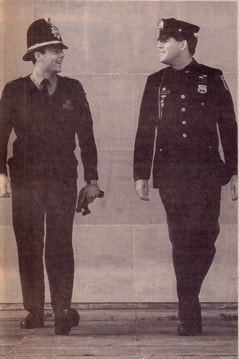Criminal Justice
.CRIMINAL JUSTICE
COURSE SYLLABUS
Mr. Michael Tuttle
Lodi High School
mailto:[email protected]
Course Title: Criminal Justice
School Year: 2022-2023
COURSE DESCRIPTION
Criminal Justice is an introduction to the inner workings of the three significant criminal justice functions in the United Sates, Law Enforcement, Courts, and Corrections. The course will give the students and overview of policing in America, the historical development of policing internationally and locally and the implementation of community based policing and criminal investigations. The course will also focus on the realities of enforcement and the apprehension of criminals at the federal, state and local level. The course will also discuss and explain the prosecution, disposition and incarceration of those suspected of committing criminal offenses.
During the year, an emphasis will be placed on developing reading, writing and interpersonal communication skills, critical thinking, logical reasoning and problem solving skills. The ability of the students to deal with stress and interact with people in various settings will be emphasized as well. Students will learn the value of honesty and integrity as it relates to working in the professional realm.
During the year, students will interact with members of the criminal justice system and they will be able to learn from their experiences. We will also use video, audio and slide presentations to expose the students to the realities of the law enforcement or legal professions.
COURSE GOALS:
CLASSROOM CONDUCT:
Mr. TUTTLE’S TWO MAIN RULES:
Rule #1 - A teacher should give 60% of the instructions needed to carry out an assignment. The Student needs to work out the other 40%. The answer to most questions reveal themselves with a bit of thought.
Rule #2 – When directions are unclear or not understood, do the assignment you feel SHOULD have been assigned
ASSIGNMENTS:
Most assigned work will be completed in class. All assignments will be completed neatly and will be typed or hand written as directed. Sloppy work is not tolerated in the professional world and will not be in class. Assignments will be completed on lined binder paper in pencil or pen.
All creative projects, term papers and special topic reports will be typed, double spaced, times new roman 12pt font, one inch margins. All referenced work must be cited properly (MLA or APA).
If a student is absent, it is the student’s responsibility to receive any work he/she may have missed. It is a good policy for students to have the phone number and e mail address of a responsible classmate that can keep them up to date on assignments they may have missed. ALL assignments are posted on Google Classroom, so there is no need to ask which assignments are missing.
EXTRA CREDIT: There is none. Don’t ask for it. If you hand in your completed work on-time you will have a good grade. I do not grade late work.
QUIZZES AND TESTS:
Tests and quizzes will consist of multiple choice, true and false and short answer questions. These grading instruments will be administered at the end of each chapter and will measure the student’s ability to recollect and recall the important issues of each chapter. Quizzes shall be administered at my discretion and may come without prior knowledge or warning.
Tests will be announced and reviewed before their administration.
MAKE-UP TESTS: There are none. I will drop your lowest grade, so if you miss a test, that will be the one dropped. Make every effort to be present on testing days.
WRITING ASSIGNMENTS:
All elements of Criminal Justice require a great deal of reading and writing. As such, you will learn to write police reports and court complaints using a format and style appropriate to its situation. Spelling, grammar and penmanship will all be part of the grading for assignments.
BINDER:
Each student will be required to maintain a 3 ring binder that will contain all completed assignments, notes, terms and correspondence
The student binder shall include;
Syllabus
Daily Assignments
All issued materials
Returned assignments
Test reviews, notes and Vocabulary lists.
TEXT:BOOK - TBA
SUPPLEMENTAL READINGS:
NJSA Title 2C (Criminal Code)
NJSA Title 39 (Motor Vehicle Code)
NJ State Bar Association press releases
Assignments: 1st Semester
Week 1& 2 – The Nature of Crime, Policing, and the Courts
Week 3&4 – Police and Law Enforcement Overview
Week 5&6 – Courts- Overview
Week 7&8 – Penal Systems Overview
Week 9&10 – Role and Function of the Police
Week 11&12 – Civil Vs. Criminal Law
Week 13& 14 – Pretrial and Trial Procedures
Week 15&16 – Punishment and Sentencing
Assignments: 2nd Semester ( Begins Mid January)
Weeks 1&2- Current Issues in Policing
Weeks 3&4 Critical Theories in Policing
Week 5&6 – Corrections History and Institutions
Week 7&8 – Motor Vehicle Law
Week 9&10 – Juvenile Justice
Week 11&12 – What are the Police (and the Courts) Allowed to do?
Week 13& 14 – Where is Criminal Justice Going
Week 15&16 – What is Justice?- Really!
Possible Field trips:
Bergen County Jail
Bergen County Coroner’s Office / County Morgue
Bergen County Courthouse
COURSE SYLLABUS
Mr. Michael Tuttle
Lodi High School
mailto:[email protected]
Course Title: Criminal Justice
School Year: 2022-2023
COURSE DESCRIPTION
Criminal Justice is an introduction to the inner workings of the three significant criminal justice functions in the United Sates, Law Enforcement, Courts, and Corrections. The course will give the students and overview of policing in America, the historical development of policing internationally and locally and the implementation of community based policing and criminal investigations. The course will also focus on the realities of enforcement and the apprehension of criminals at the federal, state and local level. The course will also discuss and explain the prosecution, disposition and incarceration of those suspected of committing criminal offenses.
During the year, an emphasis will be placed on developing reading, writing and interpersonal communication skills, critical thinking, logical reasoning and problem solving skills. The ability of the students to deal with stress and interact with people in various settings will be emphasized as well. Students will learn the value of honesty and integrity as it relates to working in the professional realm.
During the year, students will interact with members of the criminal justice system and they will be able to learn from their experiences. We will also use video, audio and slide presentations to expose the students to the realities of the law enforcement or legal professions.
COURSE GOALS:
- Explain the three major concepts of the criminal justice system in the United States: Law Enforcement, Judicial System & Corrections.
- Understand the workings of the justice system in America.
- Acquire and understand basic law enforcement techniques.
- Improve basic reading, writing and interpersonal communication skills.
- Develop critical thinking, logical reasoning and problem solving skills.
- Learn and understand basic writing techniques in the CJ system.
- Learn and comprehend basic CJ procedures.
- Study and interpret basic laws and codes, (Penal Code, Vehicle Code, etc.).
- Exposure to careers in the criminal justice system through presentations by criminal justice professionals.
- With approval from administration, at least one class trip to the County Jail or local law enforcement locations.
- Study International Criminal Justice Systems.
- Identify trends and current law enforcement issues through television media, social media and print media.
CLASSROOM CONDUCT:
- When arriving to class, open your binder and your assignment will be on Google Classroom.
- When reading in class, I expect all to be quiet, focused and courteous. If you finish your reading assignment before your peers, do not disturb them. Read ahead or enter notes into your note books. I expect your best behavior at all times. In law enforcement it is expected.
- Listen to my instructions the first time I give them to you. In law enforcement time management and attention to detail are important.
- Have all study materials ready when the bell rings.
- No cell phones, EARPODS, or electronic devices unless I approve their use.
- I will NOT interrupt my class to correct this. I will silently write up your class conduct report and you will be notified by the VPO of your punishment!
- Be prepared, Be engaged, Be attentive, Be excited. We learn by doing!
Mr. TUTTLE’S TWO MAIN RULES:
Rule #1 - A teacher should give 60% of the instructions needed to carry out an assignment. The Student needs to work out the other 40%. The answer to most questions reveal themselves with a bit of thought.
Rule #2 – When directions are unclear or not understood, do the assignment you feel SHOULD have been assigned
ASSIGNMENTS:
Most assigned work will be completed in class. All assignments will be completed neatly and will be typed or hand written as directed. Sloppy work is not tolerated in the professional world and will not be in class. Assignments will be completed on lined binder paper in pencil or pen.
All creative projects, term papers and special topic reports will be typed, double spaced, times new roman 12pt font, one inch margins. All referenced work must be cited properly (MLA or APA).
If a student is absent, it is the student’s responsibility to receive any work he/she may have missed. It is a good policy for students to have the phone number and e mail address of a responsible classmate that can keep them up to date on assignments they may have missed. ALL assignments are posted on Google Classroom, so there is no need to ask which assignments are missing.
EXTRA CREDIT: There is none. Don’t ask for it. If you hand in your completed work on-time you will have a good grade. I do not grade late work.
QUIZZES AND TESTS:
Tests and quizzes will consist of multiple choice, true and false and short answer questions. These grading instruments will be administered at the end of each chapter and will measure the student’s ability to recollect and recall the important issues of each chapter. Quizzes shall be administered at my discretion and may come without prior knowledge or warning.
Tests will be announced and reviewed before their administration.
MAKE-UP TESTS: There are none. I will drop your lowest grade, so if you miss a test, that will be the one dropped. Make every effort to be present on testing days.
WRITING ASSIGNMENTS:
All elements of Criminal Justice require a great deal of reading and writing. As such, you will learn to write police reports and court complaints using a format and style appropriate to its situation. Spelling, grammar and penmanship will all be part of the grading for assignments.
BINDER:
Each student will be required to maintain a 3 ring binder that will contain all completed assignments, notes, terms and correspondence
The student binder shall include;
Syllabus
Daily Assignments
All issued materials
Returned assignments
Test reviews, notes and Vocabulary lists.
TEXT:BOOK - TBA
SUPPLEMENTAL READINGS:
NJSA Title 2C (Criminal Code)
NJSA Title 39 (Motor Vehicle Code)
NJ State Bar Association press releases
Assignments: 1st Semester
Week 1& 2 – The Nature of Crime, Policing, and the Courts
Week 3&4 – Police and Law Enforcement Overview
Week 5&6 – Courts- Overview
Week 7&8 – Penal Systems Overview
Week 9&10 – Role and Function of the Police
Week 11&12 – Civil Vs. Criminal Law
Week 13& 14 – Pretrial and Trial Procedures
Week 15&16 – Punishment and Sentencing
Assignments: 2nd Semester ( Begins Mid January)
Weeks 1&2- Current Issues in Policing
Weeks 3&4 Critical Theories in Policing
Week 5&6 – Corrections History and Institutions
Week 7&8 – Motor Vehicle Law
Week 9&10 – Juvenile Justice
Week 11&12 – What are the Police (and the Courts) Allowed to do?
Week 13& 14 – Where is Criminal Justice Going
Week 15&16 – What is Justice?- Really!
Possible Field trips:
Bergen County Jail
Bergen County Coroner’s Office / County Morgue
Bergen County Courthouse


